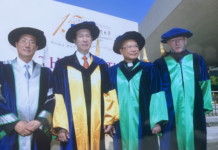Online Educa Berlin begins next week. I will be attending for the first time in many years. If you are also going, I hope to meet you.
There are many interesting sessions at the conference. Some of these are highlighted in the Online Educa news service:
The Saudi Arabian Digital Library. The National Center for E-Learning (NCeL) of the Saudi Ministry of Higher Education was launched five years ago. Of its many projects, the Saudi Digital Library (SDL) is perhaps the most impressive. Launched in November 2010, the SDL holds more than 114 000 e-Books and reference works spanning various academic disciplines. It also manages the Maknaz repository which provides interactive learning objects in different formats such as photos, instructional movies, illustrations and so forth. Dr Abdullah Almegren, Assistant Professor of Education at King Saud University and the general manager of NCeL, will be speaking at the conference.
Research on the effective of virtual patients in the teaching of medicine. Martin Riemer and his co-author Martin Abendroth have spent the past year studying the use of virtual patients by hundreds of students at the University Medical Centre Hamburg-Eppendorf, Germany, and their findings shed light on how best virtual patients should be integrated into the curriculum.
OEB session CUL38, Learning Cultures: An International Perspective brings together speakers representing universities in Brazil, Russia and India in a panel discussion exploring theoretical discourse, technology implementation and factors supporting and hindering developments in open and distance learning.
In session VIR05, The Best Kept Secrets of Game-Based Learning, distinguished speakers will offer insight into how virtual environments and game-based learning can be integrated into school [and college] curricula seamlessly in order to increase learner motivation and enhance collaborative learning.
Lieve Van den Brande, a Principal Administrator at the Directorate-General for Education and Culture of the European Commission will present a paper entitled EU Policy for ICT in Education: A New Initiative on Creative Classrooms/Creative Learning Environments. The Europe 2020 strategy is an intricate ten-year plan to revive employment and stimulate the economy of the European Union. Such a plan requires educational goals that are simultaneously ambitious yet tenable. Lieve Van den Brande will discuss these in her presentation.
Pasi Vilpas, a biology teacher at the The Sotunki Distance Learning Centre in Vantaa, Finland, is presenting “Teaching Genetics in The Second Life with a Large-Scale 3D-Model of DNA”. Pasi invited his pupils to enter the three-dimensional online virtual world of Second Life and walk and fly inside the crucial molecule.
These are just a tiny sample of the 400 presentations at the conference. The main challenge will be working out what I really must attend from all the range of options (and also to handle the bierkellers). Hope to see you on the Kurfurstendamm!










 Dr. Tony Bates is the author of eleven books in the field of online learning and distance education. He has provided consulting services specializing in training in the planning and management of online learning and distance education, working with over 40 organizations in 25 countries. Tony is a Research Associate with Contact North | Contact Nord, Ontario’s Distance Education & Training Network.
Dr. Tony Bates is the author of eleven books in the field of online learning and distance education. He has provided consulting services specializing in training in the planning and management of online learning and distance education, working with over 40 organizations in 25 countries. Tony is a Research Associate with Contact North | Contact Nord, Ontario’s Distance Education & Training Network.


Hi Tony. I’m giving a slightly contrarian presentation at EDUCA late on Friday on “Faculty Centric Online Learning”. It is more or less along the lines of “despite all the really sophisticated advances in e-learning, you may make more progress in existing higher ed if you keep it simple and play along with what faculty want”. This may offend a few techies, instructional designers and high-minded educational theorists, but I think these ideas need to be discussed. I’d be interested in your views on this.
If anyone is interested I’m also hosting a lunchtime discussion at 1pm on friday on “online labs”. Our online courses started in our School of Engineering and we have made some good progress in constructing remotely accessible rigs for practical work. However, I’m wondering how we can scale this up, say by sharing designs or sharing access to each other’s rigs. Perhaps there is a role for private manufacturers to design and produce remote access rigs.
By the way, i’ve come across a smart-phone app called shhmooze for meeting people at events and I’ve registered EDUCA on it. their site is shhmooze.com and they have an Android and iPhone app.
Thanks for your help on costs earlier this year and i hope to bump into you in Berlin.
@ Brian Mullingan If we look at the last 100 years in terms of how teaching has evolved in higher education in general, I’d say if you “play along with what faculty want” you might get some significant change, say, next century or so :-p.
Sorry, José, I did not see your reply until now. I would have thought that too once, but while not conclusive proof, the two case studies I presented seem to indicate that campuses that put the lecturers at the centre of their initiatives have done very well compared to those that took a content/instructional-design approach. Having said that, in our own case, now that we have made a great start using the lecturer-centric approach we do need to impose a little instructional design to improve quality.